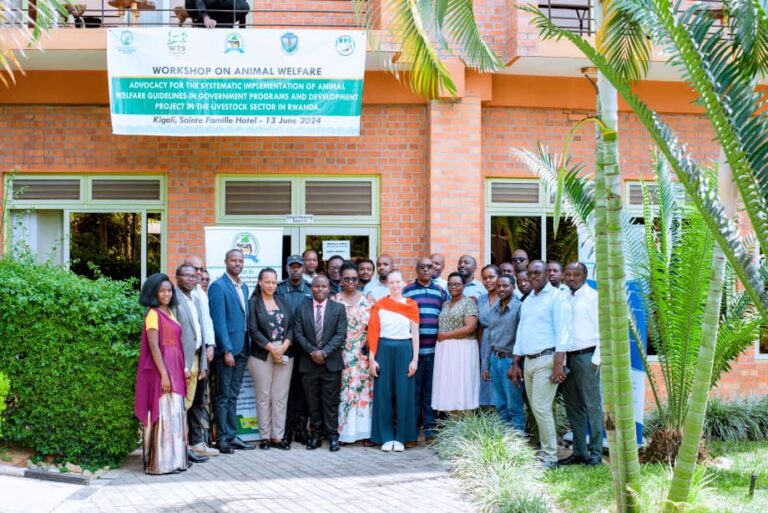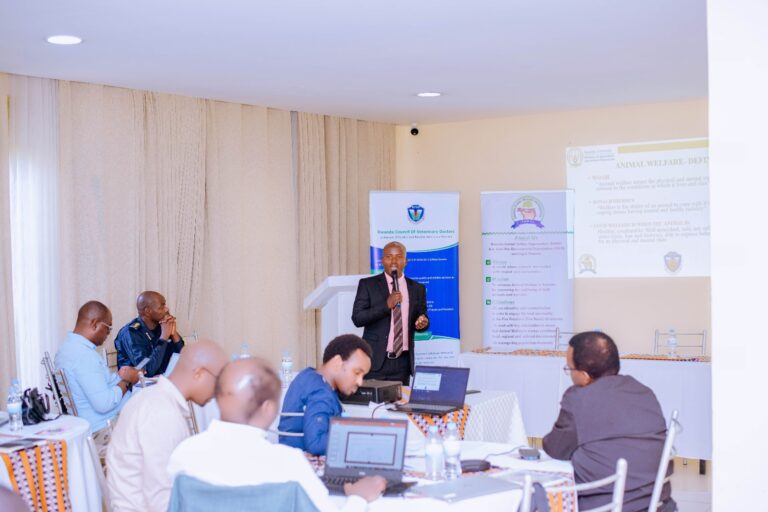RAWO Leads Advocacy for Animal Welfare Guidelines in Rwandan Livestock Development

Recently, the Rwanda Animal Welfare Organization (RAWO) spearheaded efforts to advocate for the systematic implementation of animal welfare guidelines within Rwanda’s burgeoning livestock sector. The initiative gained momentum following a workshop held in Kigali on June 13, 2024, where key stakeholders convened to strategize on integrating comprehensive animal welfare standards into government programs and development projects.
The workshop marked a pivotal agreement between RAWO and the Rwandan government, highlighting a commitment to enhance both the physical and mental well-being of animals. Jean Claude Masengesho, Executive Director of RAWO, emphasized the importance of these guidelines, citing instances where current projects have overlooked animal rights, thereby underscoring the need for improvement in the livestock sector.
“We are collaborating with WTS to ensure these guidelines are effectively implemented in Rwanda,” said Masengesho. “The process requires advocacy from stakeholders given the evidence showing gaps in animal welfare across various projects. Enhancing the livestock sector entails ensuring both increased animal numbers and improved quality of produce.”

The guidelines, developed in consultation with WTS, reflect extensive research indicating a pressing need to elevate animal welfare standards, thus optimizing the impact of development projects involving animals and communities. Crucial aspects addressed include caregiver responsibilities, levels of welfare knowledge among livestock handlers, the existence of care protocols, and measures to mitigate adverse impacts on animal welfare.
Jean Claude Ndorimana, Director General for Animal Resources at the Ministry of Agriculture, stressed the transformative potential of these guidelines in elevating livestock quality and standards. “Animal welfare forms the bedrock of improving livestock value chains. These guidelines are adaptable to our ongoing programs and projects,” he affirmed.
Echoing these sentiments, Ndorimana emphasized, “It’s crucial to protect animals from stressors, as the quality of meat derived from them directly impacts human health.”

He anticipates signing a mandate on veterinary services, followed by ministerial instructions that incorporate the new animal welfare guidelines, aligning with Rwanda’s commitment to the One Health global agenda.
Jean Claude Masengesho reiterated the collaborative effort needed to enhance both animal welfare and the livestock sector in Rwanda, highlighting the critical role of education among farmers and veterinary officers in implementing these guidelines effectively.
Looking ahead, RAWO and its partners aim to establish a robust legal framework to ensure accountability across the animal value chain. Jean Claude Shirimpumpu, President of Pig Farmers, emphasized the necessity for punitive measures, citing the far-reaching impacts of animal mistreatment on the value chain and end consumers.
Dr. Laurien Ntamugabumwe, Director of research and capacity-building at the Rwanda Veterinary Council (RCVD), identified knowledge gaps among veterinarians and farmers regarding animal welfare, emphasizing the need for targeted support.
“Both veterinarians and farmers require assistance in comprehending and applying these guidelines. Introducing this framework in educational curricula can foster a culture of animal welfare from a young age,” noted Dr. Ntamugabumwe.
According to WTS, Rwanda boasts a considerable number of veterinarians and veterinary paraprofessionals caring for approximately 5 million farm animals. However, animal welfare education remains inadequate due to a lack of specialized expertise, compounded by the absence of a structured continuous professional development program.

Addressing these concerns, stakeholders recommended expediting the approval of legal framework documents currently under review by the Prime Minister’s office, set for submission to the cabinet.
CSP Fabien Musinguzi, Rwanda Traffic Police Operations Commander, affirmed readiness to enforce these guidelines once enacted.
These regulations and guidelines are poised to bolster Rwanda’s efforts in sustainable agriculture and align with international standards, ensuring enhanced animal welfare and community well-being.
ND

